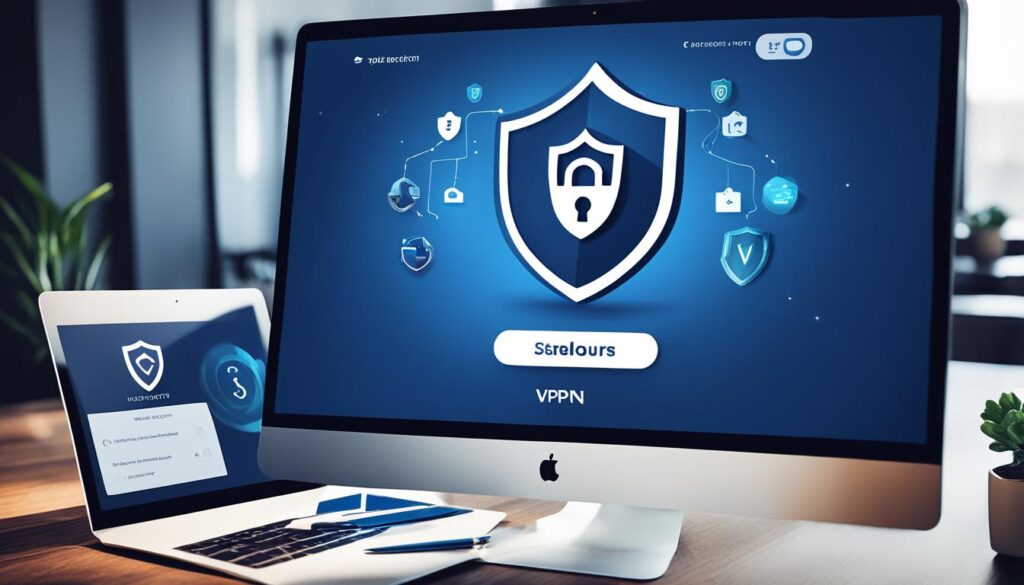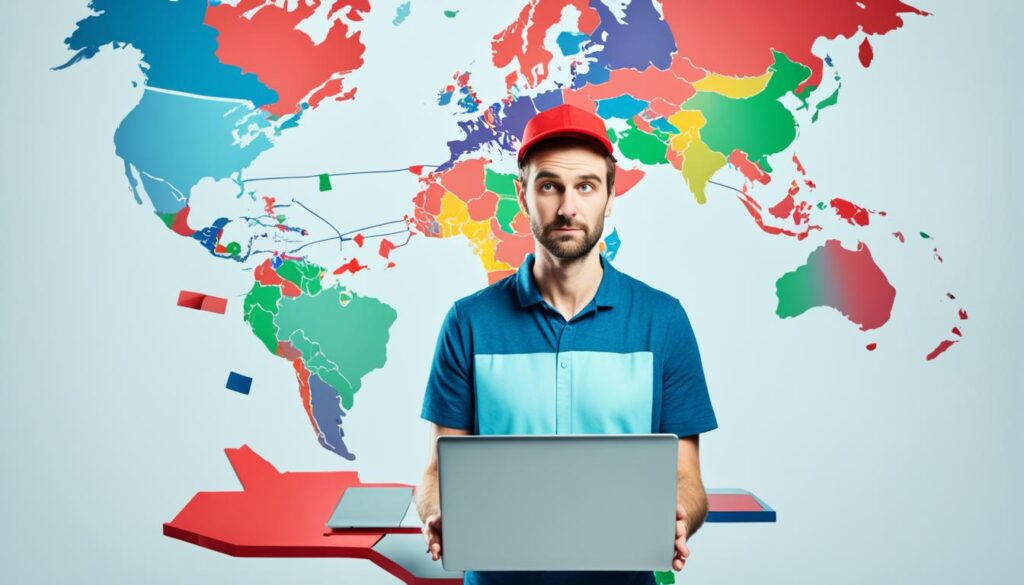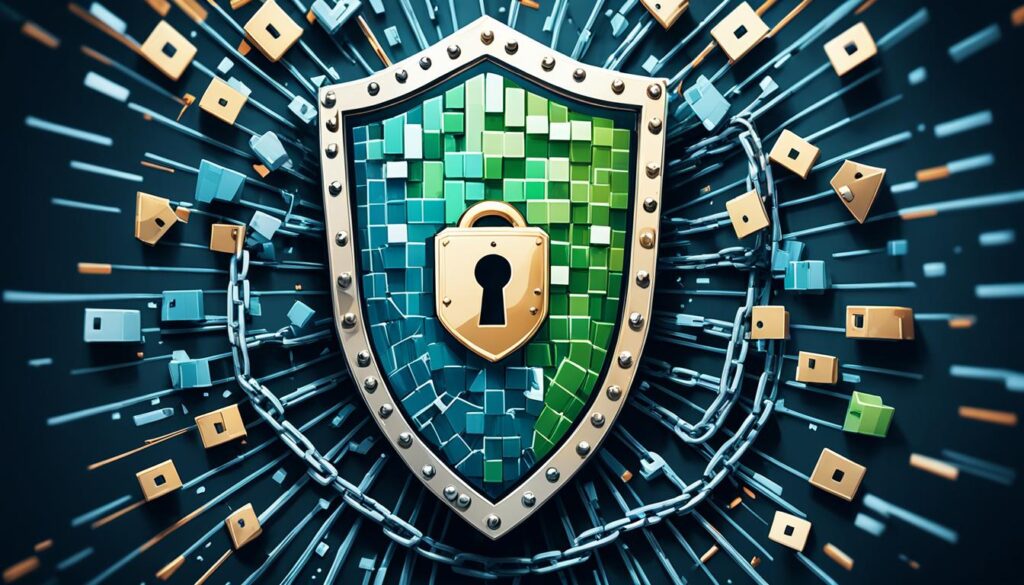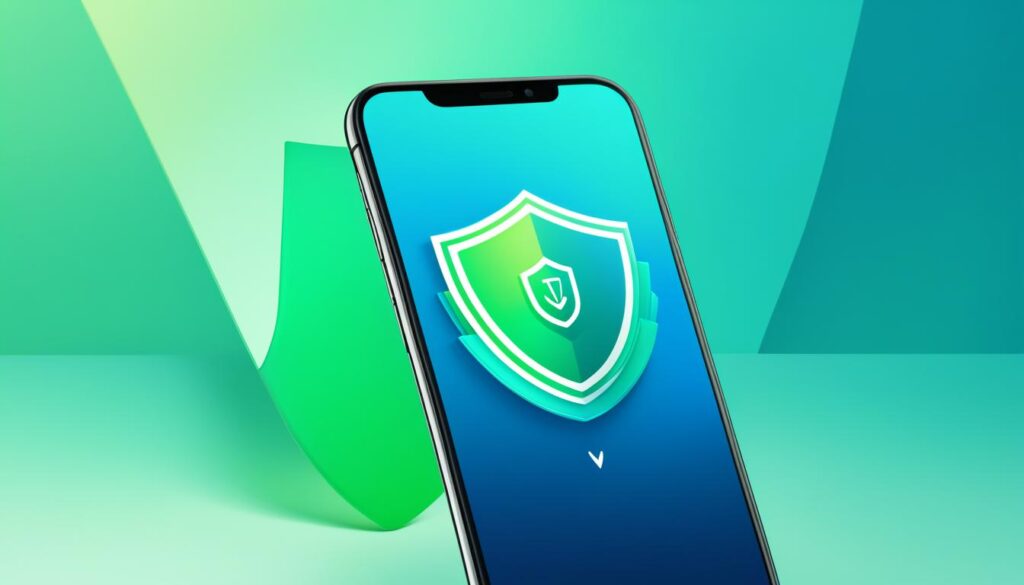Virtual private networks (VPNs) are hot topics lately. You’ve probably heard about them from YouTubers you follow. A lot of false information surrounds the use of VPNs. These myths make us think we’re safe online, mostly when we’re at home or out at the mall. Originally, VPNs were only for business needs like secure data exchange. But now, they’re becoming more popular for our personal use. They defend us against growing threats on the internet. VPNs are starting to show up on our devices. It’s crucial to clear up any confusion about them.
Key Takeaways
- VPNs are not just for businesses – they’re becoming more prevalent in our everyday online activities.
- There are many common misconceptions about VPN capabilities and their use.
- Dispelling these myths can help us better understand how to leverage VPNs for enhanced online privacy and security.
- As VPN technology evolves, it’s important to stay informed about its features and limitations.
- By addressing these VPN myths, we can make more informed decisions about protecting our digital lives.
Introduction to VPNs and Their Purpose
The online world is always changing. This makes keeping your privacy and security online very important. VPN Facts show us that VPNs are key. They build a secure path between your device and the web. This hides your IP address and keeps your online actions safe from others.
Defining Virtual Private Networks (VPNs)
VPNs aim to make your VPN Privacy better. They create a safe link from your device to the web. By sending your data through a special server, your real IP address stays hidden. This shields your online moves from anyone trying to watch.
Importance of Online Privacy and Security
Keeping your information safe in today’s digital world is a big challenge. Cybercrime and data collection are on the rise. VPNs provide an essential layer of protection. They make sure our online actions are secure and private, helping us maintain our digital rights.
Common Misconceptions about VPNs
Although many use VPNs, some myths exist about their abilities. It’s important to clear up these misunderstandings. This will help people know what VPN technology can and cannot do for their online privacy.
Myth: VPNs are Safe for Illegal Activities
Some people think VPNs are mostly used for illegal stuff like downloading stuff that’s not supposed to be shared. But, VPNs are actually made to protect your online privacy and security. Good VPN providers follow strict rules against using their services illegally. They might even help the police in some cases. Remember, VPNs are for keeping you safe online but only for legal things.
VPNs and Legal Considerations
When you use a VPN, you must think about the law. Choose one from a company known to do the right thing. These good VPN services clearly say no to any illegal use. They might tell the authorities about anything that seems wrong.
Reputable VPN Providers and Strict Policies
The best VPN companies put your privacy and security first. They have strong rules against illegal actions on their platforms. Plus, they don’t keep any info that could track what you do online or cause legal trouble for you.
Myth: VPNs Make You Completely Anonymous
Many people believe that using a VPN makes them fully anonymous online. However, while VPNs boost online privacy by hiding your IP and encrypting your data, complete VPN anonymity is not guaranteed. VPN providers might know some information about you, like your real IP, if they don’t follow a strict no-logs policy.
Limitations of VPN Anonymity
When you use a VPN, your VPN provider may still see what you do and some personal info. That’s because VPNs don’t wipe out your digital trail; they just protect it more by sending it through a secure tunnel. The amount of VPN anonymity you get changes with each provider’s rules and actions.
Importance of Choosing a Reputable VPN Provider
Picking the right VPN provider is vital for top VPN privacy and VPN anonymity. Always go for VPN services with a strong no-logs policy, safe encryption, and good history of keeping user info safe.
Balancing Privacy and Necessary Disclosures
Understanding when privacy is crucial and when you might need to share data is key while using a VPN. For activities like buying stuff online or using specific services, some user info may be needed. Make sure to know what you’re okay with sharing and pick a VPN that fits those privacy choices and needs.
Myth: Free VPNs are as Good as Paid VPNs
Many think a free VPN is equal to a paid one. But, this is not true. Free VPNs often sell user data or lower VPN Privacy and VPN Security. They might have less server locations, slower speeds, and fewer features than Paid VPN options do.
Potential Privacy and Security Risks of Free VPNs
Free VPNs might not protect your privacy like paid ones do. They can log and sell your data, or show you ads and malware. This puts your personal info and what you do online at risk, which is the opposite of what a VPN should do.
Benefits of Paid VPN Services
Paid VPN services, on the other hand, offer strong security, a big server network, and extra perks like ad-blocking and virus protection. Though they cost money, paid VPNs provide better VPN Privacy, VPN Security, and overall quality. They usually promise not to keep logs, give you stable server connections, and provide good customer service for a safe and smooth journey.

VPN Facts
VPNs are becoming more common, but some folks aren’t sure how they affect internet speed. Yes, using a VPN can make your internet a bit slower. This happens because your data is encrypted and sent through different routes. How much it slows down can change based on a few things.
Impact of VPNs on Internet Speed
The speed of your VPN can change based on the server location, the kind of encryption used, and the quality of the network. An interesting upside is that a VPN might actually speed up your internet. It does this by avoiding ISP throttling – this is when your internet provider slows down certain online activities. A VPN mixes up your data’s path, making it look like it’s from somewhere else. Thus, it helps avoid speed reductions.
Factors Affecting VPN Performance
Lots of elements can affect how well a VPN works. Things like how close you are to the VPN server, the encryption used, and network quality matter. Picking a VPN service with lots of servers worldwide and advanced technology can reduce any slowdowns. This way, your internet speed should be more steady when you use a VPN.
Bypassing ISP Throttling with VPNs
Another plus of using a VPN is that it can dodge ISP throttling. A VPN hides where your internet traffic is really coming from. So, your ISP can’t slow down certain online activities like streaming or torrenting. This can make a big difference in how fast and reliable your internet feels, beating a regular, non-protected connection.
Myth: VPNs Can Bypass All Geo-Restrictions
VPNs are useful for bypassing some geo-restrictions, but not all. VPNs face smart VPN Detection Mechanisms against them. This can block access to some content, even with a VPN.
The success of a VPN varies. It depends on the service available by the VPN, the locations it offers, and what you are trying to access. Knowing these VPNs‘ limits is crucial for managing your expectations.

Limitations of VPNs in Accessing Geo-Restricted Content
Streaming services are especially good at spotting and stopping VPN use. They now effectively stop access to geo-blocked content, making it a challenge for VPN users.
VPN Detection Mechanisms by Streaming Services
Streaming platforms use advanced methods to detect VPN traffic. They check connection speeds, server locations, and how users behave. This analysis is used to prevent VPN users from accessing some content.
Myth: VPNs are Too Complex to Use
Some people think VPNs are hard to use. But today, many VPN providers have made them user-friendly. They’ve designed VPN applications and tools that are easy to set up.
VPN services now come with simple steps to install them. They have clear interfaces that show what to do next. Good VPN providers also give strong support. This includes FAQs, guides, and real people to talk to for help.
It’s also not hard just to connect to a VPN server. For most people, this just needs one click. This means VPNs can work for a lot of different users, not just tech experts.
Myth: VPNs Protect Against Malware and Viruses
VPNs are great for certain cybersecurity benefits. They secure your web traffic on public Wi-Fi. They also guard against some online threats. But, they’re not the best for stopping malware and virus protection. They mainly focus on making your online actions more private. They encrypt what you do online and hide your IP address.
VPNs don’t actively find or remove bad software from your devices. For real malware and virus protection, you need more than a VPN.
VPNs and Cybersecurity Benefits
VPNs provide key cybersecurity advantages. They keep your internet use private and your data safe on public networks. By creating a secure, private connection between you and the internet, VPNs work well against cyber threats.
Importance of Dedicated Antivirus and Antimalware Software
For top online security, using both a VPN and dedicated antivirus and antimalware software is a must. This double protection helps fend off a broad range of online threats. It keeps your devices safe from not just malware and viruses, but other bad activities too.
Comprehensive Approach to Online Security
VPNs play a key role in making you safer online. But it takes more than a VPN for true safety. You should use a VPN along with other steps. This includes keeping your software up-to-date, being smart while browsing, and managing your passwords well.
Conclusion
VPNs are incredibly useful for making my online world more private and secure. Still, it’s key to know what they can and can’t do. They make my internet life safer by hiding my IP address and securing my browsing. But, they aren’t a total shield against cyber threats.
Choosing a trusted VPN service is critical. I should be careful with free VPN options. It’s smart to use a VPN alongside antivirus and antimalware programs. This combination offers solid defense online. Knowing the right facts about VPNs helps me guard my digital steps. It ensures my online adventures are both safer and more private.
VPNs play a big role in securing our modern cyber world. Yet, they work best when teamed with other security tools. By being well-informed, I can maximize how VPNs protect my online life. This smart combination helps me enjoy my digital journeys with great security and privacy.



